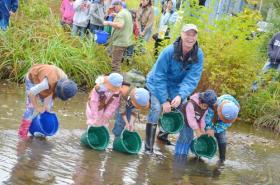National Geographic looks at current ocean topics, including the Gulf spill, noise pollution and acidification.
Blue Planet Links does not guarantee the accuracy or objectivity of the information presented on listed websites or publications. We have attempted to present a variety of perspectives on the issues in the hope that the more you know, the more likely you are to influence and make wise public and personal decisions to promote healthy oceans and fresh water.
© 2024 Blue Planet Links
NewsLinks
-
Periodicals
This weekly focuses on international news. With some sifting, you'll find in-depth articles on water and economics, politics, business, technology, pollution, climate change, resource extraction and more.
New Brunswick Environmental Network's bilingual online environmental magazine features articles on Maritime Canada's ecological and political issues related to water, a forum for opinions, some children's activities.
Online envrionmental magazine tackles environmental topics with irreverence, intelligence and a fresh perspective, its mission to "inform, entertain, provoke and encourage creative thinking about ennvironmental problems and solutions". "Gloom and doom with a sense of humor".
Search "water" for info and articles on water and water issues around the world. Calculate your water footprint, take the freshwater quiz, and peruse beautiful water-related photography.
More than 40,000 members and 100 affiliates, many of them naturalist organizations. Mission is to protect nature, its diversity and the processes that sustain it. Publishes colourful Nature Canada magazine - "the national magazine on nature and the environment" - 3 times per year, free to members.
Scan recent headlines, then type "water", "water quality", or however you want to qualify it.
Readers of this monthly magazine canoe, scuba, kayak, fish, surf, boat and enjoy all manner of water activities. Outside has committed itself to "making the battle over the most important natural resource of the 21st century our battle", starting with August 2003's "The Water Issue", which you can find under MAGAZINE. It includes articles on such complex environmental issues as the rehab of the Everglades, farms vs. fish, and the decommissioning of dams. Search "water, environment".
"Your daily guide to helping the planet": daily environmental news produced with Reuters News Agency. Australia-based organization, funded by the public, business councils, businesses and community groups. Provides reports on water, politics and economics, recycling and educational information, and national environmental events.
"The Complete Water Magazine" offers plenty for Canadian water managers and suppliers, but also water news and political issues.
BC-based bimonthly magazine offers environmental news with a "bioregional and global perspective", focusing on issues that will move us towards a sustainable society. Search items on privatization of water, bottled water, ocean acidification, pollution etc.
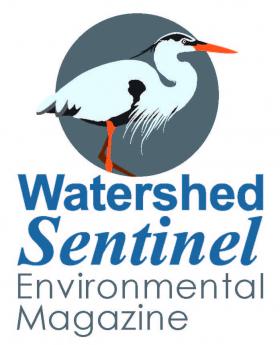
-
News clips to think about
October 27, 2018Vancouver Sun. In 2004, an oil production platform off the coast of Louisiana was destroyed by Hurricane Ivan, rupturing its wells to leak up to 300-700 gallons every day since. This investigative story looks into Taylor Energy and what could beat BP's Deepwater Horizon as the largest spill in history.
July 23, 2018Vancouver Sun. Straws may be a 'gateway plastic' in the move towards banning more single use items, but the ban's impact is negligible compared to the need for better waste management in certain developing countries.
July 23, 2018New York Times. Sixty tons of garbage collected in one week from a beach in the Dominican Republic - this is not an isolated event. Disturbing photos and video clip.
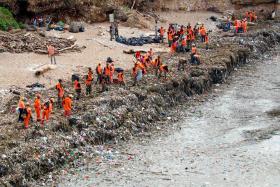 July 13, 2018
July 13, 2018Vancouver Sun. A homeowner on the Cowichan River has noticed a dramatic decline in insects and blames sunscreen residue from the river's popularity with swimmers and tubers.
July 12, 2018Science Daily. Off the coast of Cyprus in the Mediterranean Sea, many fish farms have been moved into deeper waters -- and on the seabeds beneath their previous locations, the meadows are flourishing once again.
June 20, 2018Vancouver Sun. The BC Government's decision to renew fish farm tenures in the Broughton Archipelago until 2022 invoked heaving criticism from wild salmon advocate Alexandra Morton and other environmental groups.
May 28, 2018Shaw TV Coast Connections. Watch this video to learn why Vancouver Island's Southern Resident orca population is sadly decreasing.
April 18, 2018All Point Bulletin. Washington State Department of Ecology signed a rule establishing a 'no discharge zone' in Puget Sound, allowing for 1,000 acres of commericial shellfish beds to open or upgrade for harvesting.
March 22, 2018Living Oceans. On World Water Day, Washington makes it law that open-net salmon farms in the state will no longer be allowed at the expiration of their current leases. Environmental groups call on BC to follow Washington's lead.
March 22, 2018Vancouver Sun. A special op-ed in honour of World Water Day. Describes Fraser RiverKeeper's collaborative movement with Swim Drink Fish Canada to restore people's personal connection with their waterways and give the tools and literacy to protect them.
March 5, 2018Vancouver Metro. Following the announcement that WA state will phase out open-net fish farming, pressure is on for the B.C. government to decide if they will renew fish farm tenures, including eighteen in the Broughton Archipelago area which expire in June.
February 17, 2018Vancouver Sun. One Ocean Expeditions is collecting data on microplastics during a research trip to Antarctica. The researchers now estimate that microplastics will be found in every single sample pulled from the ocean anywhere in the world. This is especially alarming considering plankton - the bottom of the food chain - mistake microplastics for food. Most microplastics are actually microfibres which come from clothing.
February 16, 2018Vancouver Sun. A UBC Engineering professor created a water-treatment system that destroys pathogens, a potential solution First Nations communities too small to be eligible for federally-funded drinking water systems. At the cost of $7,000 per home, it was installed for five families on two reserves in Lytton.
February 12, 2018UPI. Even if they survive the toxins in stormwater runoff, salmon may still suffer damage to sensors they depend on for navigation and feeding.
February 1, 2018Grist. Under President Trump's order, the EPA rescinded Obama's Clean Water Rule for two years. Also known as the Waters of the United States (WOTUS), the rule had expanded protection and stronger standards for water and wetlands. Without it, farmers and developers are far less accountable for runoff pollution.
January 24, 2018The Guardian. Photographer Mario Macilau travels around Mozambique documenting with photos and stories the desperate state of its people in their daily struggle to survive without clean water.
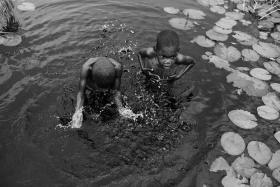 November 24, 2017
November 24, 2017The Globe and Mail. The Enhancing Cetacean Habitat and Observation (ECHO) Program - initiated by the Vancouver Fraser Port Authority in response to public pressure - monitors underwater sounds in attempt to determine how marine traffic affects marine populations.
March 22, 2017An inspiring woman convinced the right person that women and girls in Gonok Village, Ethiopia must have a better future than carrying water for four hours a day. A non-profit called A Glimmer of Hope challenged the consensus that it was impossible to build a deep well and constructed the largest solar-powered water project in the region.
June 7, 2016The Economist. What if we could map the ocean as easily as the surface of the earth? The article gives a descriptive visual as new technology revolutionizes under the sea data.
August 5, 2015Rolling Stone. Ocean acidification, drought, intense rains, exceptionally warm and cold patches of ocean, marine life migrating north, decreased plankton, dead zones... this in-depth article documents the numerous ways changes in the ocean are evidence of climate change proceeding faster than expected.
April 7, 2015Vancouver Sun. An advanced 3D computer simulation reveals that 70% of glaciers in Western Canada will be gone by 2100.
April 5, 2015The Vancouver Sun. Columnist Stephen Hume insists we must plan now for long term water security in British Columbia in the face of California's dire water shortage and a climate-altered future.
March 10, 2015See how a 114,000 litre oil spill would spread based on location, time of year, and real life tide information.
January 9, 2015By Bill Gates (LinkedIn). The Omniprocessor uses the energy created from burning feces to power itself and produce safe drinking water. Funded by the Gates Foundation, this invention is part of Bill Gates' campaign to reinvent the toilet and the sewage treatment system in order to prevent milions of deaths caused by poor sanitation.
-
Books & reports
By Stephen Hume, Alexandra Morton, Betty C. Keller, Rosella M. Leslie, Otto Langer, Don Staniford (Harbour Publishing, 2004). "Each essay is a brillliant exposition of the history, track record and ecological, economic and social impact of this infant activity." - David Suzuki
By Maude Barlow (McClelland & Stewart, 2009). What will our world look like in only 20 years? The second book in her Blue Trilogy, legendary water advocate Barlow illustrates a future where pipelines siphon water until there is nothing left but desert, industry continues to expropriate water with complete disregard for local citizens, and many die for lack of clean water. This book will open your eyes to a future we must avoid, beginning now.
By David Helvarg (W.H.Freeman & Co., 2001). How the U. S. is ruining its rivers and coastlines, as "nearly 32 billion gallons of oil, pesticides, manure and more pollutes American waters each day". However: "cleaning up shores can provide opportunities for innovation, progress and profit".
By Maude Barlow (House of Anansi Press Inc., 2013). The final book in Maude Barlow's trilogy on the global water crisis, in which she uses four powerful principles to argue for a solution to create a water-secure world.
By Maude Barlow & Tony Clarke (McClelland & Stewart Ltd., 2002). Who will wind up controlling the world's increasingly scarce fresh water resources? Should water be privatized or remain "a global commons"? Barlow and Clarke argue eloquently against commodification and for water to remain managed by "all people, communities and governments".
By Marc Reisner (Penguin USA, 1986). Basis for a critically-acclaimed PBS television series. Named by Modern Library in 2003 as one of the 100 best non-fiction books in the 20th Century.
By William McDonough (North Point Press, 2002). A radical agenda for making the world a cleaner, better place, including successful examples of how going green can improve business profits. Printed on recyclable plastic.
By Charles Wilkinson (Island Press, 1992). The book has been described as a "lyrical conservation classic", and its author, a Colorado law professor, as "the poet of western water laws".
Cruise ships are dumping an estimated $3.8 billion litres of (often untreated) sewage into the oceans each year, which is deadly to marine life. If you must cruise, take a look at Friends of the Environment's report card to choose a greener cruise line. See articles by The Guardian and Quartz outlining the problem. Cruise Control: A report on how cruise ships affect the marine environment by the Ocean Conservancy is a detailed look at the effects of this big business.
by Chris Wood, Ralph Pentland (Greystone Books, 2013). In water-rich Canada we assume we have an unlimited supply of tap water safe for consumption, but that is not necessarily the case. Wood and Pentland expose a detailed history of water mismanagement and lack of government action to safeguard our precious resource. Includes an idea for a charter that will hold government accountable for protecting water.
"Weather is changing. Get ready for it." Weather is felt most tangibly through water: rain, snow, flooding, drought, ice. In Dry Spring by Chris Woods, we learn how climate change is already affecting North American orchardists, fishers and people who live on the coast. Wood offers some suggestions about how to mitigate the worst effects.
By Walter H. Adey, Karen Loveland (Academic Press, 1998). "This unique, respected book brings together the diverse modeling efforts of two decades of research in the Smithsonian Marine Systems Laboratory, integrating the fields of ecology and aquarium science to give readers a better understanding of simulated ecosystem function and ecological food webs."
By Mark Hertsgaard (Broadway Books, 1999). Insightful, personal account as author travels the world, sees pollution that is kept "behind closed doors", and the trade-offs and environmental compromises that are made to raise living standards in developing countries.
By Brian Fagan (Bloomsbury Press, 2011). Attitudes toward water come full circle: ancient civilizations were dependent on its source for growth and considered it sacred, until we began to take it for granted in a time of perceived plenty; now, perhaps we need to adopt our ancestors' appreciation in an era of approaching scarcity as population demands overwhelm fresh water supplies.
By Jeffrey Rothfeder (J. P. Tarcher, 2001). Award-winning journalist (Privacy for Sale) uses startling statistics to warn against a major shortage of fresh water in the 21st century. International in scope, with many examples drawn from North America.
By E.C Pielou (University of Chicago Press, 1998). A scientist and naturalist talks about the everyday workings of water.
By David Suzuki (Greystone Books, 2003). The collaborative effort of environmental scientist David Suzuki and writer/researcher Holly Dressel offers positive, practical solutions for improving human life while enhancing the environment. Success stories about saved species, soil conservation, and righting social wrongs.
By B.C. Wolverton, John D. Wolverton (Wolverton Environmental Services, 2001). Despite the devastating and demanding effects of increasing population and industrialization on the world's finite water supply, Nature has amazing abilities to cleanse itself. As well, there is a developing partnership between nature's cleansing powers and man's ingenuity to create environmentally friendly, cost effective and less energy intensive water treatments. Case histories, from NASA laboratory studies to operational municipal and industrial wastewater treatment systems, "provide compelling evidence that engineered farming of wastewater can ensure the safety of our water supply for us and future generations".
By Carole Rubin (Harbour Publishing, 2002) You can still have a great garden without pesticides, fertilizer, grass seeds, or even much water! This "North American Guide to Turning Off the Tap and Going Native" provides advice for conserving water and preventing chemicals from polluting groundwater.
Marine scientists conclude that the ocean is absorbing warming and CO2 at a much faster rate than expected; decreased oxygen levels, overfishing and pollution have severely compromised its ability to act as the Earth's "buffer".
Ocean-based industries generate $13.5 billion towards BC's annual GDP, but natural capital (storm protection, carbon sequestration, abundant seafood, etc.) is valued at $101 billion in the Great Bear Sea alone. David Suzuki Foundation report emphasizes the importance of a healthy marine environment to BC's economy and encourages invesment in marine planning.
By Paul Hawken, Amory Lovins and L. Hunter Lovins (Rocky Mountain Institute, 1999). Providing water for the world needn't be a matter of governments pouring endless cash into depleting the resource and downgrading the environment - "making the same mistakes with water that they did with energy". Nor do we have to "turn lawns into cactus farms". This book is full of documented success stories and ideas for making better use of less water: farmers watering as-needed with drip irrigation, alternatives to "foolish" toilets, growing fish to enrich agricultural water, smaller-scale water treatment and The Living Machine.
By Jeffrey Hollender & Reed Doyle (New Society Publishers, 2005). Cleaning up without polluting.
By Sandra Postel (W.W. Norton, 1999). Look for other books by Postel, a member of the Global Water Policy Project, and author of papers published by the Worldwatch Institute.
University of Victoria policy researchers investigate public policy options related to water sustainability. Publications suggest that an ecosystem-based paradigm is necessary for sustainability of water resources, requiring an integrated approach by all levels of government, business, industry and society.
By Jan Reid, editor (University of Texas Press, 2004). The life and troubled times of the fabled river, which in 2001 didn't reach its destination, the Gulf of Mexico, "because of drought, irrigation demands and invasive plant species".
By Lori Pottinger (International Rivers Network, 1999). Organizing successful catchment communities.
By Sandra Postel and Brian Richter (Island Press, 2003). Why restoring and preserving natural river flows are essential to sustain freshwater biodiversity and healthy river systems. Promotes the adoption of innovative policies and a scientific approach, offering management methods to revive riparian resources.
A 2015 report by Ocean Conservancy and McKinsey Center for Business and Environment warns that plastic in the oceans could double to 250 million metric tons by 2025 - one ton for every three tons of fish. China, Indonesia, the Phillipines, Thailand and Vietnam are responsible for half of land-based sources of plastic. The solutions-based report recommends a $5 billion investment per year to reduce plastic-waste leakage by 65% in those countries and 45% globally.
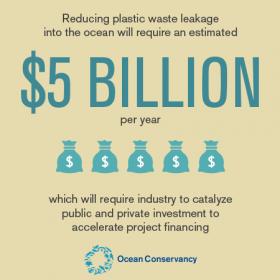
By Wendy J. Pabich (Sasquatch Books, 2012). The author documents her challenge to reduce her personal water footprint, delivering humourous anecdotes along the way as she succeds through trial and error.
By Charles Clover (2006). Fewer and smaller fish, and sometimes no fish at all - fish "mining", by-catch losses, pollution and lack of regulation and political will all contribute to declining stocks the world over. Clover proposes some reasonable solutions.
By Clive Finlayson (Oxford University Press, 2014). Biologist and palaeontologist puts forth an evolution theory based on the idea that homo sapiens' spread around the world was driven by climate change and access to fresh water.
By Iain McCalman (Farrar, Strauss and Giroux, 2014). Absorbing story of the UNESCO World Heritage Site that is moving towards the "in danger" category thanks to industrial development and dredging.
By Elizabeth C. Economy (Cornell University Press, 2004). Deforestation has turned a quarter of the country into desert... dams are changing rivers and communities... new mines pour toxic waste into rivers: China arguably opts for short-term growth at the expense of the environment.
Edited by Richard Beamish and Gordon McFarlane (Harbour Publishing, 2014). The body of water between BC's mainland and Vancouver Island is as rich in history as it is in marine life. A variety of experts author chapters on everything from the Strait's geology and geography to the impact of climate change and human actions. Read the Vancouver Sun review.
By Sim Van Der Ryn and Wendell Berry (Chelsea Green Publishing, 2000). A favorite of the back-to-the-land movement, this book provides "an informative and irreverent look at how people have dealt with human wastes over the centuries". Practical advice on designs to reduce water consumption and avoid expensive treatment systems, as well as homeowner plans for dry toilets, compost privies, and greywater systems. Looks at the history and philosophy of turning organic wastes into a rich humus.
Get your feet wet with ocean reading! This "aquatic twist on a classic club" will feature a monthly marine-themed fiction or non-fiction book complemented by an AquaBlog post highlighting the main themes and ideas.
by Peter Gleick (Island Press, 2000) An attempt to explore, understand and solve some of the most critical water issues of the day, including the looming water crisis, global warming, water-related international conflicts and privatization of water. Advocates re-thinking how we use water. Author of earlier Water in Crisis: A Guide to the World's Fresh Water Resources (Oxford University Press, 1993) and biennial World's Water reports.
Anita Roddick (Anita Roddick Publishing, 2004). The founder of The Body Shop put together a collection of thought-provoking essays from Robert F. Kennedy Jr., Maude Barlow, Vandana Shiva, and many others, which together carve a deep impression about the ultimate influence of water on the global scene.
By John Clague and Bob Turner (Tricouni Press, Gordon Soules, 2003). Although based on southwestern British Columbia, this clear, well-illustrated and non-technical book offers useful information for everyone on floods, rivers, aquifers and water flow.
By Edward Burtynsky (Steidl, 2013). Photography and stories combine to create a visually powerful presentation of different water challenges from China to the American Southwest.
By Robert Jerome Glennon (Island Press, 2002). Law professor points out how groundwater being pumped from aquifers generates profits but is drying up lakes, rivers, and wetlands, especially in southern and northeastern States.
By Diane Raines Ward (Riverhead Books, 2002). Co-director of a nonprofit organization working for conservation efforts in India, Ward examines the use and management of water and water related infrastructure in Holland, California, Egypt, and other imperiled regions. Without axe-grinding, she looks at a variety of problems such as big dams, flooding, regional conflict over water rights, and irrigation.
By Vandana Shiva (Southend Press, 2002). Prominent international environmental activist, Dr. Shiva is Director of the Research Foundation for Science, Technology and Ecology (see ActionLinks). Focusing on India, but with global relevance, she argues against water privatizaton and river diversions, and proposes means to battle water scarcity, including efficient water harvesting and water-prudent farming."
By Marq De Villiers (Stoddart, 1999). "The where, what and how much of the water world." Interesting and straight-forward examination of the resource and its future.
By Stanley Greenberg, introduction by Matthew Gandy (Princeton Architectural Press, 2003). Photographic tour of machinery, architecture, and natural features of New York City's water system, which delivers 1.3 billion gallons of water a day to 9 million people through a vast network of reservoirs, tunnels, aqueducts, and controlled lakes.
By Devra Lee Davis (Basic Books, 2002). Epidemiologist Davis documents "the struggle to force the auto, oil, coal, and chemical industries to come to terms with the environmental consequences of their unregulated release of toxic substances into our air and water - high cancer rates, heart and lung diseases, infertility, brain damage, and death".
Bernadette McDonald & Douglas Jehl, editors (National Geographic, 2003). An articulate wake-up call: well-known authors and scientists offer their own takes on how to avert disaster in meeting the challenge of diminishing water resources. Included: water ownership, water and the world's food, river use conflicts, desalting the sea.
(World Resources Institute, 2000) One of the leading state-of-the-resource reports.
-
Events
September 15, 2018The Great Canadian Shoreline Cleanup is hosting events at major beaches in Vancouver, Toronto, Ottawa and Halifax for the world's largest single-day shoreline cleanup. Sign-up today to join your fellow clean-beach appreciaters!
Georgia Strait Alliance's event page feautures info about the Vancouver Festival of Ocean Films, Orca Awareness Month (June), Water's Edge Day (September) and more!
Register for the the annual shoreline cleanup in spring. Get involved in a location near you and learn about the impacts of shore litter on wildlife and ecosystems.
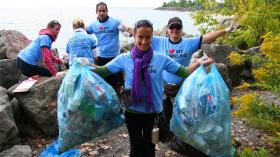
Join in! Sign up for a day, a week, or all of July and try to refuse any single-use plastic, such as bags, straws, takeaway cups, and water bottles.
Take a selfie for the sea, enter the photo contest, and create or attend an event to show your support for World Oceans Day!
Founded in 1980 by Mark Angelo. On the fourth Sunday of September every year, millions of people around the globe participate in events ranging from educational outings and community riverside celebrations to stream clean-ups and river restoration activities. British Columbia activities are spearheaded by BCIT's Rivers Institute.
Check out this news release for 2018 updates!
